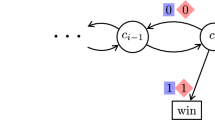Abstract
We consider multi-player graph games with partial-observation and parity objective. While the decision problem for three-player games with a coalition of the first and second players against the third player is undecidable in general, we present a decidability result for partial-observation games where the first and third player are in a coalition against the second player, thus where the second player is adversarial but weaker due to partial-observation. We establish tight complexity bounds in the case where player 1 is less informed than player 2, namely 2-EXPTIME-completeness for parity objectives. The symmetric case of player 1 more informed than player 2 is much more complicated, and we show that already in the case where player 1 has perfect observation, memory of size non-elementary is necessary in general for reachability objectives, and the problem is decidable for safety and reachability objectives. From our results we derive new complexity results for partial-observation stochastic games.
This research was partly supported by Austrian Science Fund (FWF) Grant No P23499- N23, FWF NFN Grant No S11407-N23 (RiSE), ERC Start grant (279307: Graph Games), Microsoft Faculty Fellowship Award, and European project Cassting (FP7-601148).
Fuller version: [1].
Access this chapter
Tax calculation will be finalised at checkout
Purchases are for personal use only
Preview
Unable to display preview. Download preview PDF.
Similar content being viewed by others
References
ArXiv (2014), Full version http://arxiv.org/abs/1404.5453
Alur, R., Henzinger, T.A., Kupferman, O.: Alternating-time temporal logic. Journal of the ACM 49, 672–713 (2002)
Baier, C., Bertrand, N., Größer, M.: On decision problems for probabilistic Büchi automata. In: Amadio, R.M. (ed.) FoSSaCS 2008. LNCS, vol. 4962, pp. 287–301. Springer, Heidelberg (2008)
Bertrand, N., Genest, B., Gimbert, H.: Qualitative determinacy and decidability of stochastic games with signals. In: Proc. of LICS, pp. 319–328 (2009)
Chatterjee, K.: Stochastic ω-Regular Games. PhD thesis, UC Berkeley (2007)
Chatterjee, K., Doyen, L.: The complexity of partial-observation parity games. In: Fermüller, C.G., Voronkov, A. (eds.) LPAR-17. LNCS, vol. 6397, pp. 1–14. Springer, Heidelberg (2010)
Chatterjee, K., Doyen, L.: Partial-observation stochastic games: How to win when belief fails. In: Proc. of LICS 2012; Journal version ACM ToCL, pp. 175–184. IEEE (2012)
Chatterjee, K., Doyen, L., Gimbert, H., Henzinger, T.A.: Randomness for free. In: Hliněný, P., Kučera, A. (eds.) MFCS 2010. LNCS, vol. 6281, pp. 246–257. Springer, Heidelberg (2010)
Chatterjee, K., Doyen, L., Henzinger, T.A., Raskin, J.-F.: Algorithms for omega-regular games of incomplete information. Logical Methods in Computer Science 3(3:4) (2007)
Chatterjee, K., Doyen, L., Nain, S., Vardi, M.Y.: The complexity of partial-observation stochastic parity games with finite-memory strategies. In: Muscholl, A. (ed.) FoSSaCS 2014. LNCS, vol. 8412, pp. 242–257. Springer, Heidelberg (2014)
Chatterjee, K., Jurdziński, M., Henzinger, T.A.: Simple stochastic parity games. In: Baaz, M., Makowsky, J.A. (eds.) CSL 2003. LNCS, vol. 2803, pp. 100–113. Springer, Heidelberg (2003)
De Wulf, M., Doyen, L., Raskin, J.-F.: A lattice theory for solving games of imperfect information. In: Hespanha, J.P., Tiwari, A. (eds.) HSCC 2006. LNCS, vol. 3927, pp. 153–168. Springer, Heidelberg (2006)
Finkbeiner, B., Schewe, S.: Coordination logic. In: Dawar, A., Veith, H. (eds.) CSL 2010. LNCS, vol. 6247, pp. 305–319. Springer, Heidelberg (2010)
Henzinger, T.A., Kopke, P.W.: Discrete-time control for rectangular hybrid automata. Theor. Comp. Science 221, 369–392 (1999)
Kechris, A.: Classical Descriptive Set Theory. Springer (1995)
Madhusudan, P., Thiagarajan, P.S.: Distributed controller synthesis for local specifications. In: Orejas, F., Spirakis, P.G., van Leeuwen, J. (eds.) ICALP 2001. LNCS, vol. 2076, pp. 396–407. Springer, Heidelberg (2001)
Martin, D.A.: Borel determinacy. Annals of Mathematics 102(2), 363–371 (1975)
Mohalik, S., Walukiewicz, I.: Distributed games. In: Pandya, P.K., Radhakrishnan, J. (eds.) FSTTCS 2003. LNCS, vol. 2914, pp. 338–351. Springer, Heidelberg (2003)
Papadimitriou, C.H.: Computational complexity. Addison-Wesley (1994)
Peterson, G.L., Reif, J.H.: Multiple-person alternation. In: FOCS, pp. 348–363 (1979)
Pnueli, A., Rosner, R.: On the synthesis of a reactive module. In: Proc. of POPL, pp. 179–190. ACM Press (1989)
Ramadge, P.J., Wonham, W.M.: Supervisory control of a class of discrete-event processes. SIAM Journal of Control and Optimization 25(1), 206–230 (1987)
Ramanujam, R., Simon, S.: A communication based model for games of imperfect information. In: Gastin, P., Laroussinie, F. (eds.) CONCUR 2010. LNCS, vol. 6269, pp. 509–523. Springer, Heidelberg (2010)
Reif, J.H.: Universal games of incomplete information. In: Proc. of STOC, pp. 288–308 (1979)
Reif, J.H.: The complexity of two-player games of incomplete information. JCSS 29, 274–301 (1984)
Reif, J.H., Peterson, G.L.: A dynamic logic of multiprocessing with incomplete information. In: Proc. of POPL, pp. 193–202. ACM (1980)
Thomas, W.: Languages, automata, and logic. In: Handbook of Formal Languages. Beyond Words, vol. 3, ch. 7, pp. 389–455. Springer (1997)
Author information
Authors and Affiliations
Editor information
Editors and Affiliations
Rights and permissions
Copyright information
© 2014 Springer-Verlag Berlin Heidelberg
About this paper
Cite this paper
Chatterjee, K., Doyen, L. (2014). Games with a Weak Adversary. In: Esparza, J., Fraigniaud, P., Husfeldt, T., Koutsoupias, E. (eds) Automata, Languages, and Programming. ICALP 2014. Lecture Notes in Computer Science, vol 8573. Springer, Berlin, Heidelberg. https://doi.org/10.1007/978-3-662-43951-7_10
Download citation
DOI: https://doi.org/10.1007/978-3-662-43951-7_10
Publisher Name: Springer, Berlin, Heidelberg
Print ISBN: 978-3-662-43950-0
Online ISBN: 978-3-662-43951-7
eBook Packages: Computer ScienceComputer Science (R0)




